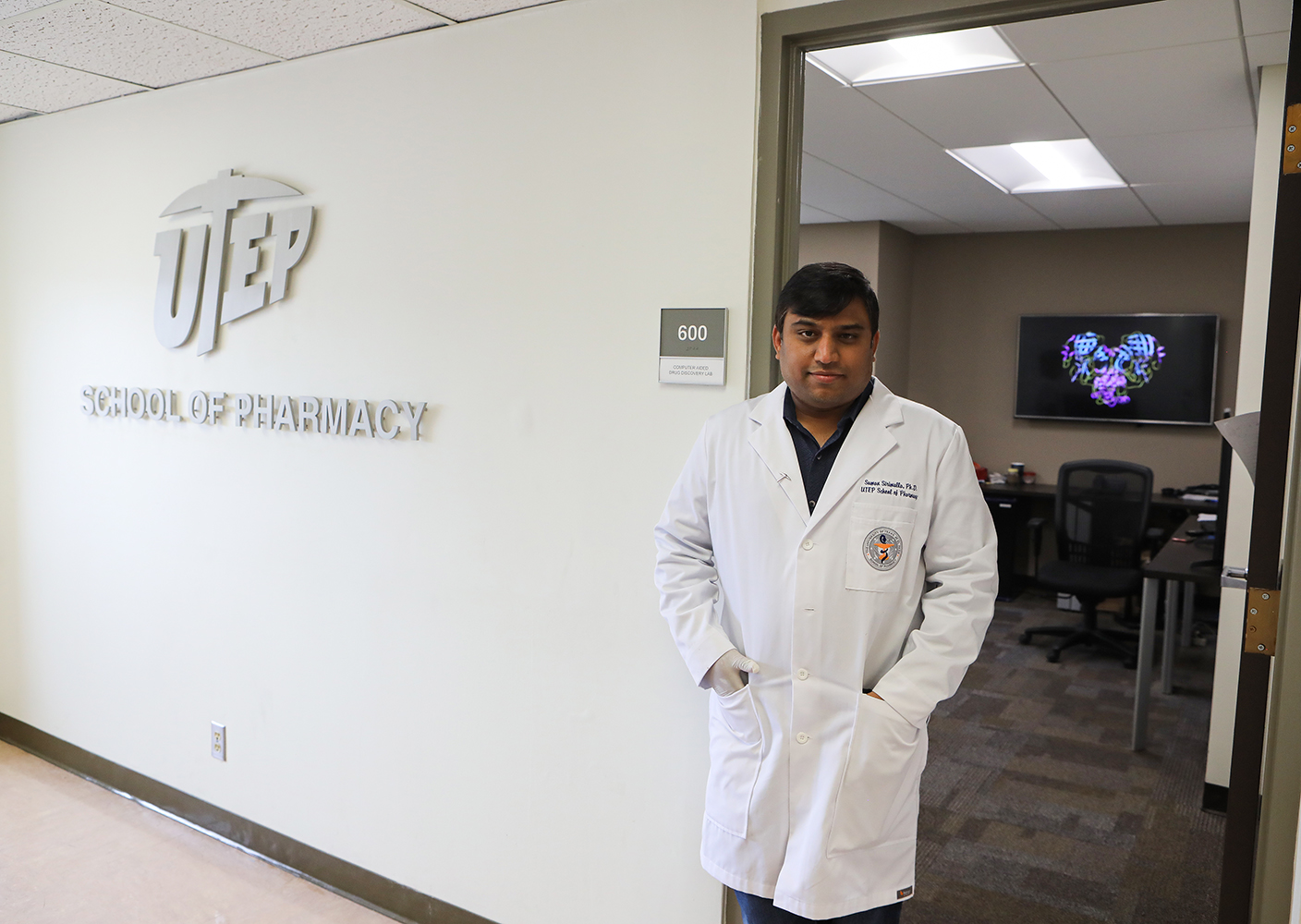UTEP School of Pharmacy Developing COVID-19 Vaccine, Drug Treatments Using Supercomputing
Last Updated on April 08, 2020 at 12:00 AM
Originally published April 08, 2020
By Laura L. Acosta
UTEP Communications
Research is underway at The University of Texas at El Paso’s School of Pharmacy to develop vaccines and antiviral drugs to combat the novel coronavirus within 15 months to two years.

Suman Sirimulla, Ph.D., assistant professor of pharmaceutical sciences at UTEP, is leading a group of experimental researchers to virtually develop the molecular structure of a protease inhibitor that would target the coronavirus, which causes COVID-19, a respiratory illness that can spread from person to person.
“UTEP faculty members advance discovery of public value,” said UTEP President Heather Wilson. “We have high expectations for Dr. Sirimulla’s research and look forward to his development of therapies to combat the novel coronavirus infection.”
Sirimulla is collaborating with UTEP faculty members Md Nurunnabi, Ph.D., assistant professor of pharmaceutical sciences, and Manuel Llano M.D., Ph.D., associate professor in the Department of Biological Sciences; and Tudor I. Oprea, professor of medicine and chief, Translational Informatics Division, Department of Internal Medicine at the University of New Mexico.
Using computational methods, Sirimulla is piecing together small molecules to create inhibitors of viral proteins – specifically, inhibitors that will bind to the coronavirus’s S-protein, or spike protein, and block it from attaching to and infecting healthy cells. He is also developing inhibitors of coronavirus main protease, which is an attractive target due to its essential role in processing the polyproteins that are translated from the viral RNA. Scientists will be able to use the new protease inhibitor to develop drugs effective against COVID-19.
“The coronavirus targets the respiratory cell’s ACE2 and TMPRSS2 enzymes and uses the spike protein to attach itself to them,” said Sirimulla, a computational chemist with more than 10 years of drug discovery research experience. “Once the virus gets into the cell, it begins to replicate. What we are trying to do is target the virus’ RNA-dependent RNA polymerases enzymes that are involved in replicating the virus.”
Sirimulla is running simulations through The University of Texas System's Texas Advanced Computing Center (TACC), which provides researchers with high-performance computing, scientific visualization and data storage systems. Sirimulla will simulate the interaction between the molecules and the viral proteins to better understand and refine the binding process. He also will employ artificial intelligence algorithms that will recommend which molecules to use.
The process for developing a new drug can take up to 10 years. However, because of the urgency to produce novel drug therapies to treat COVID-19, Sirimulla said they can have a vaccine or antiviral drug ready in 15 months to 2 years.
“These computer-aided approaches are common in pharmaceutical sciences research, and Dr. Sirimulla’s expertise is uniquely suited to make significant contributions to the fight against COVID-19,” said Marc B. Cox, Ph.D., professor in biology and chair of the Pharmaceutical Sciences Department in Pharmacy at UTEP. “His work and contributions toward solving this global public health crisis reaffirm UTEP’s status as an R1 institution, and validate the impact that scientific research has in our communities.”
Virologists at UTEP and at other universities will validate Sirimulla’s findings through experimental procedures in their labs.
In the meantime, Llano said he will develop an assay that, in the absence of the virus, will allow them to test Sirimulla's predictions.
“At this stage of the project we will not work with the virus but with a few individual viral proteins that we will generate by chemical synthesis,” Llano said. “Therefore, this project does not involve any biosafety risk. If we find compounds able to inhibit the viral proteins, we will seek collaboration with laboratories outside UTEP that can work with the virus in order to test the antiviral efficacy of these compounds. If the compounds are effective against the virus, then we will find collaborators that can test the compounds in animals infected with the virus. If our compounds protect the animals from infection and do not cause toxicity to the animals, then clinical trials need to be conducted. Therefore, this is just the beginning of a long project that has the potential to obtain a therapeutic drug.”
Nurunnabi said his role in the project is do the bench work using in vitro and in vivo techniques to identify the potent molecules and validate accordingly. He also will do the feasibility studies along with biocompatibility and biosafety.
To date, more than 350,000 people in the U.S. have been infected by the coronavirus and more than 10,300 people have died from complications caused by the infection.
Oprea and Sirimulla have previously collaborated on several projects related to applications of machine learning and artificial intelligence in drug discovery.
“Given the current situation and urgent need of therapeutics for the treatment of COVID19, we are joining forces to design/develop drugs from multiple directions,” Oprea said. “Formally, I am Dr. Sirimulla's mentor within the UTEP system. I believe that the computational resources made available via UTEP resources can make a significant impact in accelerating the discovery process.”
To speed up the design process, Sirimulla is screening large quantities of molecules – over a billion compounds – that can be readily synthesized and are available through online chemical libraries. His goal is to find molecules that contain compounds that will likely produce the appropriate biological response and inhibit the spread of the coronavirus.
Sirimulla also is enlisting the help of volunteers through BOINC@TACC, a project that integrates volunteer computing and TACC’s supercomputers. Volunteers who join BOINC@TACC will be able to run Sirimulla’s application on their computers and help him scour through billions of molecules available in online libraries.
